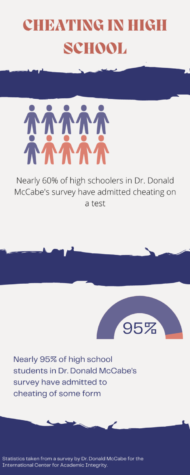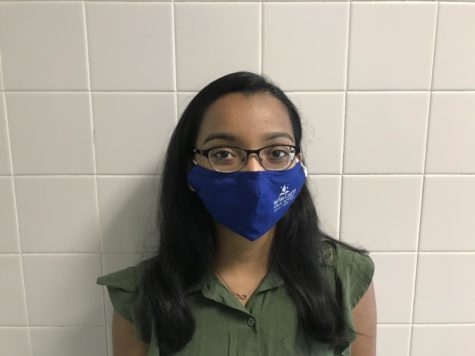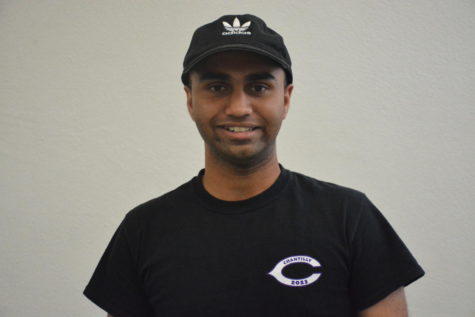Academic epidemic: Cheating widely affects student achievement
During online tests or assignments, some students may resort to searching up answers on their phone. “[When a] student cheats, the teacher is more disappointed,” junior Vyas Yaddanapudi said. “They start to question their teaching abilities just because their student decided to take shortcuts.”
June 3, 2022
The night before her AP World History unit test, sophomore Sameera Pasham finds herself scrambling through her notes and textbook, while fighting her anxiety over the test. Although students like Pasham uphold academic integrity by thinking about the consequences if she gets caught, some students give in to the pressure of performing well, resorting to dishonesty. Looking around them, these students find their peers cheating, and, as a result, they also cheat.

Performance pressure stimulates cheating
According to Carnegie Mellon University, most students cheat as a result of poor study skills, stemming from years of lack of awareness about study skills, that prevent them from effectively grasping the information.
“Whenever I don’t understand the content, I feel like giving up,” Pasham said. “Most people [lack] the willpower to persevere through hard content.”
While writing essays and lab papers, students often resort to simply copying answers from others or off the internet, which is considered plagiarism.
Some ways students can improve their study skills by studying together with successful students or asking the teacher for tips on how to practice the material, according to Cuesta College.
While poor study skills can lead to academic dishonesty, external factors, such as performance pressure, also contribute to academic dishonesty. In a study conducted by International Center for Academic Integrity founder David McDonald, 95% of high school students admitted to cheating in some form.
“People cheat because they feel pressure to do well, whether that’s personal or because of their parents,” sophomore Siddhi Surawkar said. “They don’t see another way to succeed, so they cheat because then they know they will definitely do well as opposed to relying on their own skills and knowledge.”
However, it is often not the student’s poor study skills or performance pressure that contributes to cheating. Per the Los Angeles Times, a large percentage of cheating in high school occurred as a direct result of an environment that ignored it by not enforcing the consequences of cheating.
“When the school does not take action against students who cheat, it will send a message to everyone that cheating is a somewhat acceptable thing,” junior Vyas Yaddanapudi said.
In Fairfax County Public Schools, a first offense of cheating on a test results in parent notification and a discipline referral. A student is not suspended until the third offense.
“This notion that you don’t face a serious consequence until your third offense gives you the impression that you can cheat once or twice,” Yaddanapudi said.
With the AP exams less than a month away, students expect to see more cheating than during the regular classes. According to Forbes, about 70% of test takers admitted that they have considered cheating on the AP exam.
“With AP exams, a lot more is at stake than just a simple test or a class grade,” Pasham said. “Doing well on the AP exams allows you to get college credits, which obviously puts more pressure on you.”
Methods of cheating evolve
The manner in which students cheat is heavily dependent on the type of assignment or test that is being completed. For assessments done on paper, students often write notes on paper and try to hide the cheat sheet. Many top universities, such as the University of Washington, report that the most common type of cheating is plagiarism when students copy others’ work and claim it as their own.
“If a student feels the pressure to do well on an assessment and sits with their back to a corner, they’re going to find a way to cheat,” Spanish teacher Sarah Travis said. “I definitely remember, when I first started teaching, [I found] little Post-It notes stuck underneath tables.”
Travis is able to easily identify if an assignment was done using Google Translate because the student uses language that is at a higher level than what they are taught in class. Additionally, the Spanish department has started giving more application-based assessments instead of recall-based assessments.
With online assessments, students can easily switch between tabs or search up answers to cheat. Students also attempt to collaborate with one another in the midst of testing by using AirDrop to share answers—forgetting that teachers can also receive AirDrops.
“It’s not that the teachers aren’t technically savvy, it just would never occur to most of us to use [AirDrop] for that function,” Travis said.
In math classes, students use apps such as Desmos, WolframAlpha and Mathway to cheat during a test. The result of using these programs to cheat may reflect in their inability to perform well in future math courses and on exams.
“I have seen some people sneak in a piece of paper that has formulas on it,” Yaddanapudi said. “Some students also pull up graphing apps on their phone to cheat on tests.”
Despite the ever-changing methods to cheat, teachers are quickly catching up to these antics. Programs such as Formative, which can flag copy-pasted writing, and AP Classroom, which introduced a lockdown browser that prevents students from leaving the server while taking assessments, are preventative measures teachers are using to curb cheating.
Cheating results in expulsions, long-term consequences
According to the FCPS honor code, consequences range from holding a conference with a parent or guardian to retaking a test. However, in college, academic dishonesty can have dire legal issues, ranging from expulsion to prevention from getting admission in any other college.
“Once you’re caught, there are no second chances in college,” chemistry teacher Latha Shankar said. “I don’t know how some of these students will overcome their habitual obsession to cheat through things.”
Cheating on a regular basis can result in a lack of confidence and motivation, according to the National Library of Medicine.
“If [students] cheat a lot, it can hurt their confidence because they feel like they aren’t smart enough to do well without cheating,” Surawkar said.
Furthermore, cheating on an AP exam can result in cancellation of scores of prevention from taking future college board exams.
Although many students claim to cheat in order to maintain high grades, several teachers offer a 100% retake policy, allowing students to boost their grades on assessments, projects and classwork. Students who plagiarize usually are required to redo the assignment for full to partial credit.
“If a student has an off day, they shouldn’t rely on one of their friends to provide them with the answers,” biology teacher Kaitlyn Sullivan said. “They should still do their best and if they need an opportunity to improve their grade, they can take that opportunity.”


![During online tests or assignments, some students may resort to searching up answers on their phone. “[When a] student cheats, the teacher is more disappointed,” junior Vyas Yaddanapudi said. “They start to question their teaching abilities just because their student decided to take shortcuts.”](https://chantillynews.org/wp-content/uploads/2022/05/IMG_6734-900x675.jpg)

